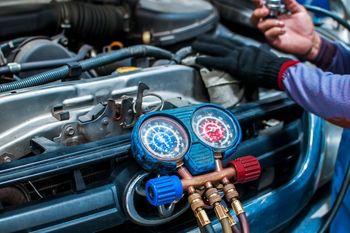Auto Air Conditioning Repair
Auto Air Conditioning Repair
Auto Air Conditioning Repair for Gainesville, FL
Florida is known for its hot weather. During our scorching hot summers, temperatures can climb up well into the 90's and higher, with high levels of humidity and blazing sunlight. It's vital to have a properly working air conditioning unit, especially in your car. Driving through the Gainesville area without cool air is incredibly uncomfortable, and even unsafe in some cases. If you suspect that your vehicle's air conditioning system is not working properly, bring it to Billy's Auto Repair & Towing! Our auto repair shop provides prompt, accurate auto air conditioning repair services.

Convenient Towing
Our 24/7 towing services have made us famous. We understand that a breakdown or an auto accident never occurs at a convenient time or place, so we try our best to make addressing the entire situation as efficient as possible. We offer lock-out services and flatbed towing as well, making us flexible to your specific needs. Billy’s Auto Repair & Towing is ready to provide the emergency towing service you need at an affordable rate.
How Does Your Car's Air Conditioning Work?
Like in a building, your car's air conditioning system works by removing the heat and moisture out of the air that already exists in your vehicle, leaving cooler air behind. This is done by a continuous process of evaporation, condensation, compression, and expansion of the air in your car. The components of your auto air conditioning system are as follows:
- Refrigerant: This is the fluid that passes throughout your whole air conditioning system. It can evaporate at a low temperature and condense again at a higher pressure.
- The Compressor: This is the work horse of your auto air conditioning system. It's powered by a drive belt that connects to the crankshaft in your engine. Its job is to pump refrigerant vapor under high pressure to the condenser.
- The Condenser: The condenser is used to change the high-pressure refrigerant vapor coming from the compressor into a liquid. Once the vapor condenses into a liquid, it generates a great deal of heat. The heat is then removed from the condenser by air flowing through the condenser on the outside.
- The Receiver-Dryer: The refrigerant, now a liquid, is then pumped into the receiver-dryer, which removes any outside moisture that may have leaked into the refrigerant. Excess moisture in your auto air conditioning system can cause blockages and mechanical damage, so it's important to filter anything that's not refrigerant liquid out.
- The Expansion Valve: The pressurized refrigerant next flows to the expansion valve, which will remove pressure so the liquid refrigerant can expand and become vapor in the evaporator again.
- The Evaporator: As the cold, low-pressure refrigerant passes through the evaporator, it is vaporized and absorbs heat from the air in the passenger compartment of your vehicle. The blower fan inside the passenger compartment will then push air over the outside of the evaporator, circulating the cold air throughout your car. The condensate in the air is collected and drained away as the refrigerant is drawn back to the compressor to repeat the cycle all over again.
If you have a working understanding of how the components in your auto AC system work, you could have a better comprehension of what needs repair when your system breaks down.
How to Keep Your Auto Air Conditioning Running Smoothly
With the proper tricks to stay on top of your car's air conditioning system, you should keep it running well for years to come. Every time you get your vehicle serviced, have us check your car's refrigerant levels to make sure they are where they need to be. Many experts recommend that you be sure to run your air conditioning at least once a week, regardless of the weather or temperature outside. This keeps every component of your car's air conditioning system well lubricated and running well. If you think that your air conditioning system needs extra work, we can perform a full service for you.
How to Tell if Your Car's Air Conditioner Needs Repair
Usually, the first way to tell that something is wrong with your car's air conditioning system is when you notice that it's not blowing truly cold air anymore. Set your car's A/C system to max cold and turn the fan all the way up. If you're still getting cool but not cold air, there are a few things that could be going on:
- It's possible that your air filter is clogged - check it for bugs, leaves, or other debris that could be preventing air from moving over the compressor.
- There could be a problem with your compressor - this is the vital component of your auto's air conditioning system. It pressurizes the refrigerant that cools your car, plus it monitors and controls temperature output. If your compressor is worn or malfunctioning, your car's air conditioner won't work properly.
- There could be a leak somewhere. Leaking refrigerant will cause your air conditioner to stop blowing cold air.
Call Our Auto Air Conditioning Repair Specialists Today!
If you suspect that something is wrong with your air conditioning system, give us a call. We'll provide expert auto air conditioning repair to determine what the problem might be and fix it quickly so you can go back to driving in comfort.
Web Design
by LocalEdge, all rights reserved

